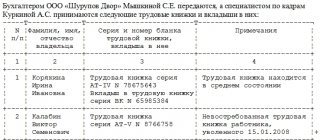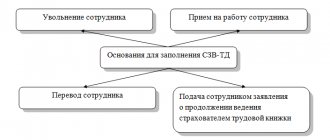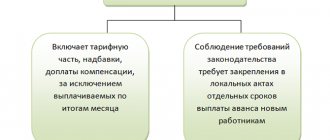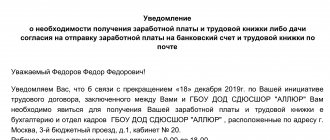There is such a general opinion that it could be simpler than the procedure and process of dismissal at one’s own request: the employee wrote a statement, the employer calculated it, and also issued a work book - and that’s all. But as practice shows, such termination of work activity does not always go smoothly both for employees and, in principle, for employers. Many people working in an organization may have a question during such dismissal, from what day do the two weeks of work begin? It is this question that we will consider in the article.
Legal regulation
The main document regulating the procedure for terminating employment relations and the procedure for establishing the required deadlines is the Labor Code.
At the same time, a large number of different rules have been issued regarding dismissal, used in some cases and in connection with various reasons for termination of employment relations.
Depending on such reasons, the timing of dismissal and subsequent procedures change.
Note! The following articles of the Labor Code are devoted to issues related to the temporary characteristics of the dismissal procedure:
- Article 71. It deals with the use of special notice periods for dismissal while the employee is on a probationary period,
- Article 77. This article establishes various grounds for dismissal,
- Article 79. Establishes the period of validity of a fixed-term employment agreement,
- Article 80. It sets out the time frame for leaving at one’s own request,
- Article 84.1. This article regulates the general rules of dismissal.
At the same time, managers and employees need to be aware that the time frame for dismissal is also established by other regulations in certain situations.
In addition, the dismissal mechanism includes not only the need to comply with the established time frames related to the dismissal itself, but also those deadlines that are allocated for carrying out actions accompanying the dismissal.
General issues of calculating terms in labor relations are regulated by Article 14 of the Labor Code. However, those articles that clarify the procedure for calculating time limits for certain cases are the main ones, for example, some provisions of Article 84.1.
When fired, they are forced to work for two weeks.
How far in advance must an employee give notice of dismissal?
Many people often wonder whether an employee must work for two weeks; is it possible to fire him without such a period?
The main provisions governing the termination of an employment agreement at the initiative of the employee are established in Article 80 of the Labor Code. As a general rule, an employee is required to notify the employer of his intention to resign two weeks in advance. This time period is considered working off.
However, the plot of Article 80 indicates that the parties have the right to agree that they will not have to work off. As a rule, the resignation letter indicates the reason for the absence of work and the date of the last working day.
After analyzing the application and the reason given by the employee, the manager can meet him halfway and not insist on working off.
In other words, by law the employee must work for two weeks. However, there are circumstances that allow an employee not to do this.
Watch the video. Processing upon dismissal of an employee:
Vacation with impending dismissal
This is a pretty good option for dismissal. By choosing it, you get time that you can use: either to look for a new job, or, for example, to complete an internship in a new place. The day of dismissal will be considered the last day of vacation.
Often hired employees use this option to evaluate whether a new job is suitable or not, etc. Moreover, if you understand that you were “overreacting,” you have the right to withdraw your application and remain at your previous job.
A significant advantage of this decision is that you have the number of days in reserve that the vacation provides. The disadvantages are that if the time does not coincide with your vacation schedule, then whether to provide you with vacation before dismissal or not is up to the employer to decide, since this is his right.
What day does work begin after notice of dismissal?
The dismissal employee's work starts on the day following the day the required application is submitted. This rule is contained in Article 80 of the Labor Code.
For example: Sidorov B.B. wanted to resign of his own free will. For this purpose, he drew up a statement on May 6, 2021. This means that the mining will begin on May 7, 2021 and end on May 21, 2021.
However, if an employee goes on vacation or is absent from work due to illness, the working time does not increase. Vacation days and sick time are included in the two-week working period.
Note! In addition, an important issue will be the possibility of including weekends and holidays in the calculation of working hours. The answer to this question is in Article 14 of the Labor Code.
The content of this article states that the time established by the code includes non-working days. Consequently, during weekends and holidays the working period does not stop.
Can an employer reduce the working period?
According to Article 80 of the Labor Code, the period for dismissal at will is fourteen days as a general rule. This means that the employer has the right not to fire an employee without mandatory work upon dismissal.
If necessary and if a compromise solution is found, the head of the organization has the right to reduce the time frame for terminating the employment relationship at the initiative of the employee, but may not do this.
Date of dismissal in the application and order
The basis for canceling the contract between the worker and the employer is a statement indicating the date of termination of the employment relationship. It is also indicated in the order and in the work book.
The employer has no right to change the date without the employee’s knowledge.
Is it possible to quit on the day you submit your application?
Article 80 of the Labor Code contains grounds when an employee does not have to work two weeks after submitting an application.
Important! These reasons will be:
- retirement,
- enrollment as a full-time student at a university, which makes it impossible to continue working,
- violation of legal norms by an employee,
- other cases.
Other cases mean the following reasons:
- work in another area,
- change of place of residence,
- husband (wife) moving to work in another country,
- caring for a child up to the age of fourteen, a child with physical or mental disabilities or a sick child,
- caring for an adopted child up to fourteen years of age,
- pregnancy.
Certain companies, in their collective bargaining agreements, establish additional grounds for “fast-track” dismissal.
If the reasons for which the employee would like to leave without working are not covered by Article 80 of the Labor Code, then it is possible to analyze the local acts of the company in which he works. It is likely that there are additional grounds that can be cited.
You should know that it is not always possible to receive a payment so quickly and pick up the work book immediately after management has familiarized itself with its decision. Due to certain circumstances, the head of the organization may need some time. General issues of calculating terms in labor relations are regulated by Article 14 of the Labor Code.
Attention! Our qualified lawyers will assist you free of charge and around the clock on any issues. Find out more here.
How to quit without working?
But since many are interested in dismissal without working for two weeks, we will list what reasons contribute to this process. There is Article 80 of the Labor Code of the Russian Federation, which lists all the compelling reasons for such a situation. These are valid reasons and allow you to receive payment immediately. Among them the main ones are:
- the family moves to another city or country (in this case, it is also taken into account if one of the spouses moves, the reason for the move is a transition to a new job);
- dismissal without work for child care (in this case, this means care in case of pregnancy or the need to care for a disabled child);
- the employer violated the terms of the employment contract;
- the employee has learned of a serious illness that makes it impossible to fulfill his work obligations, there is a medical report, officially issued, that this activity negatively affects the person’s health;
- dismissal without working for a pensioner (if he got a job after receiving state support);
- disability ;
- the staff or position is being reduced (this basis is more likely to apply to the employer than to the employee; for more details about dismissal due to job reduction, follow the link);
- conscription into the army;
- received a prison sentence.
USEFUL : watch the VIDEO with advice from a labor lawyer and describe your problem in the comments of the video to get advice from a labor lawyer for free
When you are fired within 3 calendar days
There are certain cases when it is allowed to terminate an employment relationship after working only three days.
Such situations include:
- in accordance with Article 71 of the Labor Code, if an employee is currently on a probationary period, then in case of dismissal he must work only three days instead of two weeks,
- Article 292 indicates that a three-day working period is established for those persons whose employment agreement was concluded for a period not exceeding two months,
- if an employee is engaged in seasonal work, then, under Article 296 of the Labor Code, his work will be equal to three days.
If a citizen is a seasonal worker, then he must ensure that this is specifically stated in the agreement. Without such a clause, he will be considered a “regular” employee, even if the nature of his professional activity specifically “speaks” of the seasonality of the activity.
The form of an application for dismissal of an employee on his own initiative without working out is almost the same as that of a standard application. The only difference will be the requirement to record the basis on which the right not to serve the term arose. In certain situations, this will be enough, but you may also need evidence confirming your right to skip work.
Please note! In other words, the application must be accompanied by all available documents that can confirm the right to immediate termination of the employment relationship. The date in the document is set to the current one, that is, the date the application was drawn up.
Dismissal during vacation or sick leave
While on vacation or sick leave, an employee also has the right to resign freely. He can draw up a statement in advance, and then go on vacation or sick leave.
This applies only to dismissals at the initiative of the employee himself; the manager does not have the right to dismiss him himself if the vacation period or sick leave has not yet ended. In addition, management does not have the right to recall an employee from vacation in order to fire him for something.
What reason for dismissal should I include on my resume?
If the employee first sent an application, and after that went on another vacation, then the last day of the vacation period will be the final actual day of work, and the day of dismissal will be recognized as the day after which the vacation started. On the same day before the vacation, you are allowed to receive a work book and a full payment.
If the application was submitted in advance, and then the employee fell ill and went on sick leave, then the day of departure may fall on sick leave.
This date does not change or be postponed if the employee has not withdrawn his application, therefore, wages are provided for all days worked and that part of the sick leave that fell for the period before the actual date of dismissal.
Important! If the employee is still sick after this, the company is not required to pay him benefits. However, if an employee initially quit and fell ill within a month after dismissal (provided that he did not find a new job), he can still qualify for a payment of 60% of the average salary.
If the dismissed person is still ill and cannot come to the place of work after dismissal, a note is made in the order that it is impossible to familiarize him with the order. He will be able to receive a work book and full payment at any time.
The due amount must be provided to him on the same day or the next day after the request is submitted. This applies to both wages and compensation for the vacation period. The sick leave benefit is assigned in the same way as for working employees, that is, within ten working days after the sick leave is provided, and is transferred to the day of the next payment.
Do I need to work 2 weeks upon dismissal?
There is no separate law on working off upon dismissal, but there are several articles of the Labor Code of the Russian Federation regulating the terms. This can be either 2 weeks or 3 days.
Note! The maximum period of service upon dismissal is 14 days for ordinary employees, and one month for managers. According to Art. 14 of the Labor Code of the Russian Federation, the warning period includes weekends and holidays, and it is calculated in calendar days. The manager has the right, but is not obligated, to wait until the end of work. He can dismiss a subordinate on any day by mutual agreement, including the day the application is submitted.
Let's consider when 2 weeks of work are prescribed by law, and when other deadlines are established.
At your own request
According to Art. 80 of the Labor Code of the Russian Federation, the period of service upon dismissal at one's own request is 14 calendar days. It is counted from the day following the date of submission of the application.
The period of work depends on the method of filing the application. For example, if it is sent by Russian Post, the notice period does not include the delivery time of the letter. You will have to wait until the employer receives it, and only the next day the countdown will begin.
During vacation
An employee can apply for leave with subsequent dismissal, or resign while on leave.
Let's look at examples of how long you need to work to quit:
Example No. 1: an employee submitted an application to the employer for annual paid leave with subsequent dismissal on April 10. Work off is counted from the 11th. The contract with her must be terminated on the last day of rest.
Example No. 2: an employee is on vacation from August 5 for 14 calendar days. On the 7th he brought his resignation letter. The warning period begins on August 8. Rest is provided until the 18th inclusive, work before dismissal ends on August 21. In the period from the 19th to the 21st, inclusive, the person resigning must be at work, the dismissal is formalized on the 21st. Work from August 8 to August 18 inclusive is included in vacation.
During sick leave
An application for resignation can be submitted before the opening of sick leave or during illness. Dismissal is issued on the day specified in the application; it cannot be changed unilaterally. If there is no date, the contract is terminated at the end of the notice period.
How much work do you need to do upon dismissal in different situations:
Example No. 1: the application was submitted before sick leave.
The employee decided to resign on November 7 and sent a statement. He was given detention. On November 9, he fell ill and opened a sick leave, only closing it on the 12th. The warning period lasts from the 8th and ends on November 21 (date of dismissal). During the period from November 13 to November 21 inclusive, he must be at his workplace.
Example No. 2: the application was submitted while on sick leave.
The employee went on sick leave on September 10 and submitted her resignation on the 13th. Work begins on September 14 and ends on September 27. Sick leave closed on the 15th. From September 16 to September 27 inclusive, she must go to work.
Training for managers
In Art. 280 of the Labor Code of the Russian Federation states how long, according to the law, you need to work off upon dismissal - one month. A written warning is sent to the owner of the organization’s property, or his representative.
Working for a month upon dismissal during sick leave or vacation is considered the same as two weeks. For example, if the application is submitted on June 10, the dismissal must take place on July 11.
Work upon dismissal during a probationary period
Dismissal within three days is possible on the basis of Art. 71 Labor Code of the Russian Federation. If during the test an employee realized that the job was not suitable for him, it is enough to submit a letter of resignation three days in advance. The same applies to the employer, if the subject does not suit him for objective reasons: he warns the latter about terminating the contract within three days in writing.
Important! A two-week work period for voluntary dismissal during probation is not assigned; this is considered a violation. If, after the probationary period, the employee continues to work, he is considered to have passed the test, and he submits his own application two weeks in advance.
Work under a fixed-term employment contract
The duration of mandatory service upon dismissal depends on the term of the contract:
- Up to two months - the employer is warned three calendar days before leaving (Article 292 of the Labor Code of the Russian Federation).
- Up to four months - the application must be submitted one month in advance (for athletes, coaches, Article 348.12 of the Labor Code of the Russian Federation).
In other cases, you need to work for 2 weeks, for managers - one month.
By agreement of the parties
Art. 78 of the Labor Code of the Russian Federation allows you to terminate a contract by agreement. The parties themselves determine the terms; dismissal can be processed 3 days in advance or immediately on the day the document is signed. A two-week period of service under the Labor Code upon dismissal is not necessary in this case.
At the initiative of the employer
The employer may terminate the contract on his own initiative on the basis of Art. 81 Labor Code of the Russian Federation. For example, if the company is liquidated, or an employee has committed a one-time gross violation. Two weeks of work upon dismissal are not assigned in this case, but in order to bring disciplinary action it is necessary to request an explanatory note from the offending employee. It is provided to the manager within two working days.
The date of dismissal is indicated in the order and determined by the employer depending on the situation.
Calculation deadlines for dismissal of an employee
The calculation periods are fixed in Article 140 of the Labor Code. In the event of termination of the employment agreement, the provision of all amounts due to the employee from the employer is carried out on the day of his dismissal.
If the employee did not work on that day, then such amounts must be provided no later than the next day after the employee submits the request for payment.
If there is a disagreement about the amount of amounts due to the employee in the event of dismissal, the head of the organization must, within the time limits established in the above article, provide the part of the amount that is not disputed by him. Severance pay is money given to an employee who leaves an organization.
On the day of dismissal, a full calculation is made, that is, it is calculated how much money the company owes the employee (this amount includes compensation for unused vacation days, unpaid wages, various additional payments issued to the team or that were specified in the employment agreement).
Money may be deducted from the calculated amount, for example, if the employee took a vacation in advance.
How to join the labor exchange?









